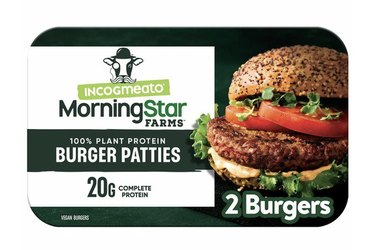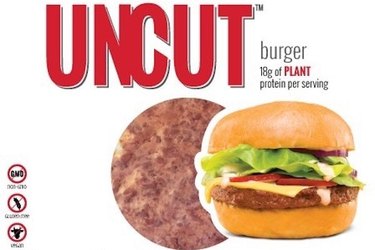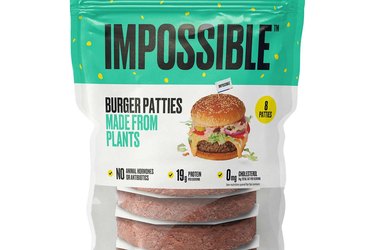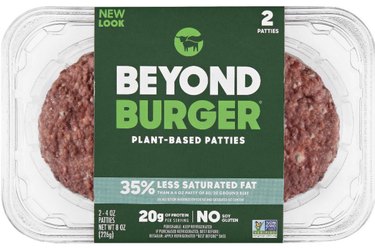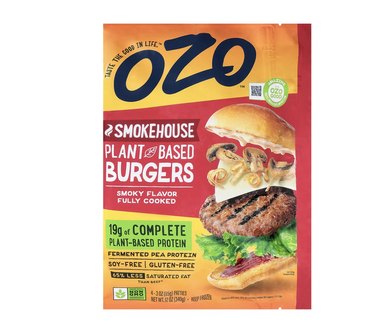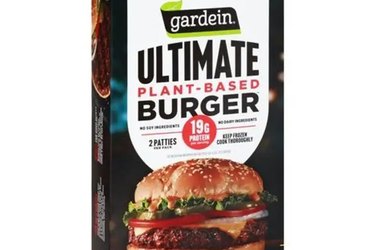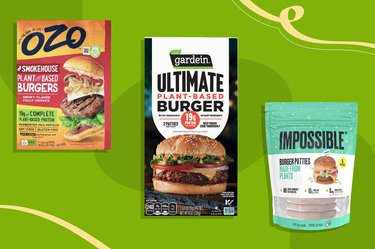
Maybe you're a vegetarian or maybe you're just looking to reduce your ecological footprint. In either case, veggie burgers are a great way to incorporate non-animal protein sources into your diet.
Some are grain- and rice-based, while others are soy-based and more closely resemble meat, says Lauren Harris-Pincus, RDN and author of The Protein-Packed Breakfast Club. "The new generation of faux meats are designed to recreate an experience of eating meat not only for people who avoid animal products but also for those who are looking to eat less meat for health or environmental reasons."
Video of the Day
Video of the Day
There is a myriad of veggie burger options to choose from these days. To make shopping easier, we rounded up the best veggie burgers on the market.
The Best Veggie Burgers
- Best Overall: Morningstar Farms Incogmeato Burger (Price varies per store)
- Best Gluten-Free: Before the Butcher Uncut Plant-Based Burger ($60.95, Food Service Direct)
- Best Flavor: Impossible Burger ($13.48, Walmart)
- Best Meat-Like Burger: Beyond Burger ($5.99, Target)
- Best Protein: Ozo Plant-Based Burger ($8.79, Instacart)
- Best Plant-Based: Gardein Ultimate Plant-Based Burger ($4.79, Mercato)
- Best Soy: Tofurky Plant-Based Burger ($8.99, Instacart)
How We Chose
We chatted with six registered dietitians about their favorite products and asked how to choose the best veggie burger. With their input, we narrowed down the top veggies burgers based on the following criteria:
- Protein
- Sodium
- Saturated fat content
- Fiber
Tip
Not everyone wants to shop for fresh or frozen foods online. You can also find all of these products at various, nationwide grocery stores.
1. Best Overall: Morningstar Farms Incogmeato Burger
Per serving: 250 calories, 18 grams fat (5 grams saturated fat), 370 milligrams sodium, 12 grams carbohydrates (8 grams fiber, 1 gram sugar, <1 gram added sugar), 20 grams protein
This veggie burger from Morningstar Farms is made with no animal products, so it's 100 percent vegan. The protein in them comes from soy, and you'll get an impressive 20 grams from one patty without all the saturated fat you'd get from a beef burger!
It's worth noting that these burgers do contain gluten for texture and consistency, so they're not safe for people with celiac disease or a gluten allergy or sensitivity.
Apple and vegetable juices in these veggie burger patties mimic the color of meat, while potato starch and other hearty ingredients pump up each patty with a respectable 8 grams of fiber.
Buy it: In stores near you; Price: Varies
2. Best Gluten-Free: Before the Butcher Uncut Plant-Based Burger
Per serving: 260 calories, 17 grams fat (9 grams saturated fat), 260 milligrams sodium, 8 grams carbohydrates (6 grams fiber, 0 grams sugar), 19 grams protein
Soy takes center stage in these gluten-free, fairly low-sodium and high-fiber quarter-pound veggie burger patties.
Also available in turkey, chicken and sausage substitute varieties, these taste like they just came off the grill (even if you cook them on the stove) thanks to their smokey flavor.
Buy it: Foodservicedirect.com; Price: $60.95 for 6 boxes
3. Best Flavor: Impossible Burger
Per serving: 240 calories, 14 grams fat (8 grams saturated fat), 370 milligrams sodium, 9 grams carbohydrates (3 grams fiber, <1 gram sugar, <1 gram added sugar), 19 grams protein
Since 2016, these veggie burger patties from Impossible were known for their smoky, gamey flavor by way of heme, a compound that typically comes from meat, but is also found in smaller amounts in plants. (Impossible's heme is made with soy and yeast.)
Soy and potato protein give these veggie burger patties an impressive 19 grams of protein. A dose of coconut oil and sunflower oil makes the texture beefier, although this means each quarter-pound patty meets 40 percent of your saturated fat quota for the day.
4. Best Meat-Like Veggie Burger: Beyond Burger
Per serving: 260 calories, 18 grams fat (5 grams saturated fat), 350 milligrams sodium, 5 grams carbohydrates (2 grams fiber, 0 grams sugar), 20 grams protein
As the first plant-based veggie burger that mocks real meat ever sold in the States, the Beyond Burger browns nicely while staying medium rare-ish on the inside thanks to beet juice.
Compared to other veggie burgers on this list, these are reasonable in the saturated fat department and have zero sugar. Free of soy and gluten, each quarter-pound pattie is stocked with protein from peas, mung beans, fava beans and brown rice to give you 20 grams of the nutrient.
Buy it: Target.com; Price: $5.99
5. Best for Protein: Ozo Plant-Based Burger
Per serving: 210 calories, 10 grams fat (2 grams saturated fat), 350 milligrams sodium, 6 grams carbohydrates (1 gram fiber, 1 gram sugar, <1 gram added sugar), 22 grams protein
"Ozo's burger has much less saturated fat than the other options with just about the same protein, calories and sodium," Previte says.
The brand says its unique fermentation process might make the plant-based protein easier for your body to digest, process and put to use building muscle.
Buy it: Instacart.com; Price: $8.79
6. Best Plant-Based: Gardein Ultimate Plant-Based Burger
Per serving: 240 calories, 15 grams fat (10 grams saturated fat), 450 milligrams sodium, 8 grams carbohydrates (1 gram fiber, <1 gram sugar, <1 gram added sugar), 19 grams protein
Joining Chik'n, Turk'y, Porkless and Fishless products in Gardein's line-up are these new quarter-pound patties that are made with pea and wheat protein, plus beet juice to give them a beef-like look.
Palm oil, coconut oil and salt crank up the saturated fat and sodium count in these veggie burger patties, so keep that in mind as you eat the rest of the day.
7. Best Soy: Tofurky Plant-Based Burger
Per serving: 250 calories, 16 grams fat (7 grams saturated fat), 540 milligrams sodium, 7 grams carbohydrates (0 grams fiber, 1 gram sugar, 0 grams added sugar), 19 grams protein
Tofurky has created a soy and vegetable protein burger that's fairly low in carbs and sugar. It does have a significant amount of sodium and saturated fat, though.
"One burger has about 50 percent of your daily value of saturated fat on a 2,000 calorie diet," Previte says. That said, these patties are probably best enjoyed in moderation.
While they don't have any fiber, these veggie burgers do boast a respectable 19 grams of plant-based protein.
Buy it: Instacart.com; Price: $8.99
Are Veggie Burgers Healthy?
About 45 percent of those surveyed believe that plant alternatives are healthier than animal meat, according to May 2020 research from the International Food Information Council.
While plant-based meat requires less water to produce, it's not necessarily better for your body. "Plant-based burgers can absolutely be a part of a healthy diet. However, just because they are made of plant-based proteins does not inherently make them 'better' than their meat counterparts," says Lauren Smith, RD, lead dietitian at Happy Strong Healthy.
"Many of the new plant burgers that taste like real meat and are very similar to a beef burger from a macronutrient perspective." Their protein content is comparable to meat burgers, but many plant-based burgers have more sodium and less cholesterol, adds Samantha Previte, RD, a dietitian with Dietitians of Palm Valley.
Many plant-based burgers are also comparable — and in some cases higher — in calories to a lean beef burger, Harris-Pincus says.
To help you parse the good veggie burger brands from the bad, here are some factors to keep in mind.
What to Look For in a Veggie Burger
1. Protein
If you're making this the main portion of your meal, your meat-like patty should offer at least 10 grams of protein, says Meghan Pendleton, RD, a registered dietician based in Michigan.
"This is a pretty minimal amount for a meal, but when combined with other ingredients like a whole-wheat bun, cheese or other sides, the total amount of protein would be at least around 20 grams," she says. "Some veggie burgers may only have a few grams of protein, which is why (for any of these items), it's important to read the nutrition label."
2. Fiber
As far as fiber goes, many plant-based burgers have at least a few grams, and the more the better, Pendleton says. If your pick doesn't have any fiber, pair it with a side of veggies and a whole grain.
3. Whole Foods
Mollie Ferguson, RD, LDN, a registered dietician, recommends searching for veggie burger products that contain whole foods. That's because whole foods may be easier for your body to break down. "Look for ingredients like tofu, soybeans, lentils, black beans, nut and seeds and spices," she says.
What to Watch Out For
1. Sodium
The FDA considers any product with 20 percent or more of your recommended daily sodium limit (460 milligrams) to be high in sodium. Buy veggie burger patties that falls below that level, or at least below 560 milligrams if the burger is your main meal.
2. Saturated Fat
To mimic the consistency of ground beef, many veggie burger brands replace the animal fat with coconut oil. "Coconut oil is very high in saturated fat and might increase cholesterol levels," Harris-Pincus says, adding that she prefers sources of healthy unsaturated fat.
The American Heart Association recommends that 5 to 6 percent of total calories come from saturated fats (on a 2,000-calorie diet, this works out to 13 grams of saturated fat or less daily), so choose a burger with a maximum of 10 grams of saturated fat — the lower, the better — and limit your saturated fat for the rest of the day if your burger is on the higher end.
3. Gluten and Other Potential Allergens
If you have a condition like celiac disease or a gluten sensitivity, note that many meatless burgers include wheat gluten or other wheat binders. Some also contain soy and coconut, which are common allergens.
"Those with diet restrictions and food allergies need to be careful and read the ingredient labels on food products like veggie burgers," Harris-Pincus says.
